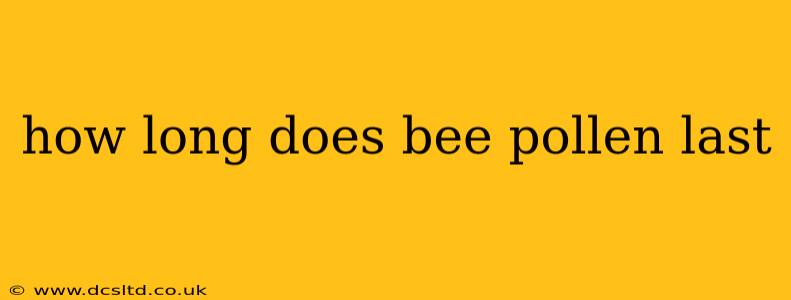Bee pollen, a nutritional powerhouse packed with vitamins, minerals, and antioxidants, is a popular supplement enjoyed by health-conscious individuals worldwide. However, understanding its shelf life and proper storage is crucial to preserving its potency and preventing spoilage. This comprehensive guide will answer all your questions about how long bee pollen lasts and how to ensure you get the most out of this natural product.
How Long Does Bee Pollen Last?
The lifespan of bee pollen significantly depends on how it's stored. Generally, fresh bee pollen can last for up to two years if stored correctly. However, its nutritional value and potency may start to diminish over time. The quality will decrease gradually, so it's best to consume it within the first year for optimal benefits. After two years, you should consider discarding it.
What Factors Affect Bee Pollen Shelf Life?
Several factors influence how long your bee pollen remains fresh and potent:
- Moisture Content: High moisture levels promote the growth of mold and bacteria, leading to spoilage. Properly dried bee pollen with low moisture content will last longer.
- Temperature: Exposure to high temperatures accelerates deterioration. Store bee pollen in a cool, dark place to extend its shelf life.
- Air Exposure: Oxygen can oxidize the pollen, reducing its quality and nutritional value. Airtight containers are essential for preserving freshness.
- Light Exposure: Direct sunlight can degrade the beneficial compounds in bee pollen. Store it away from direct light.
- Packaging: The type of packaging influences how well bee pollen is protected from moisture, air, and light.
How to Store Bee Pollen Properly to Maximize Shelf Life
Proper storage is key to extending the life of your bee pollen. Follow these tips:
- Airtight Containers: Store bee pollen in airtight glass jars or food-grade plastic containers. This prevents moisture and air from affecting the quality.
- Cool, Dark, and Dry Place: The ideal storage location is a cool, dark, and dry area, such as a pantry or cupboard away from direct sunlight and heat. Avoid storing it in the refrigerator, as the fluctuating temperatures and humidity may negatively impact its quality.
- Freezing Bee Pollen (Optional): For long-term storage, you can freeze bee pollen. Place it in an airtight container and freeze it. This method can extend its shelf life significantly, preserving its quality for up to several years. However, remember to thaw it completely and consume it within a reasonable timeframe after thawing. Avoid repeated freezing and thawing cycles.
Does Bee Pollen Expire?
While bee pollen doesn't have a printed expiration date like processed foods, it does degrade over time. The quality and potency decrease, so it's crucial to understand the signs of spoilage. Look for mold, unusual odors, or changes in color and texture. If you notice any of these signs, it's time to discard the pollen.
What are the Signs of Spoiled Bee Pollen?
- Mold Growth: The presence of any mold is a clear indication that the bee pollen has spoiled and should be discarded immediately.
- Unusual Odor: A rancid or unpleasant smell indicates spoilage. Fresh bee pollen usually has a slightly sweet, earthy aroma.
- Changes in Texture: If the bee pollen becomes unusually damp, clumpy, or sticky, it suggests spoilage.
- Changes in Color: Significant discoloration compared to its initial color could indicate deterioration.
Can you eat bee pollen past its "expiration date"?
While bee pollen doesn't have a formal expiration date, consuming it after it has visibly spoiled could lead to gastrointestinal upset or allergic reactions. It's always best to err on the side of caution and discard pollen that exhibits signs of spoilage.
By following these guidelines, you can ensure your bee pollen remains fresh, potent, and safe for consumption for as long as possible, allowing you to enjoy its numerous health benefits. Remember to always check for signs of spoilage before consumption.
